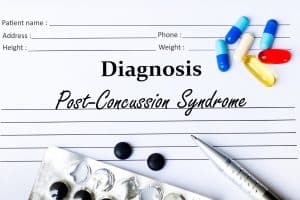The Seriousness of Post-Concussion Syndrome
 The types of accidents and activities that can leave you with a concussion span the spectrum. Car accidents, bicycle accidents, pedestrian accidents, and even participation in contact sports can lead to brain injuries both severe and mild.
The types of accidents and activities that can leave you with a concussion span the spectrum. Car accidents, bicycle accidents, pedestrian accidents, and even participation in contact sports can lead to brain injuries both severe and mild.
At Breakstone, White & Gluck, our personal injury attorneys in Boston have decades of experience in representing Massachusetts clients who have suffered all types of head injuries, including concussions and post-concussive syndrome. Here are just a couple of our successes in cases involving concussions:
- $1,800,000 Bicyclist Hit in Crosswalk – Mild traumatic brain injury, post-concussion syndrome.
- $1,600,000 Negligence – College student suffers concussion and post-concussion syndrome.
Please check our Results page to read even more, and don’t forget our Client Testimonials.
Concussions are a type of mild traumatic brain injury (TBI). Symptoms may disappear after a couple days, but often post-concussive symptoms can last for a prolonged period of time. This is known as post-concussive syndrome (PCS).
What are the symptoms of PCS?
PCS refers to the continuation of concussion symptoms beyond the typical recovery period. If symptoms persist for 1-2 months, doctors may diagnose patients with PCS.
The Mayo Clinic lists these to be the following symptoms for persistent PCS:
- Headaches
- Dizziness
- Fatigue
- Irritability
- Anxiety
- Trouble falling asleep or sleeping too much
- Loss of concentration and memory
- Ringing in the ears
- Blurry vision
- Noise and light sensitivity
- Rarely, decreases in taste and smell
Following a concussion, headaches commonly resemble tension-type headaches, possibly arising from a concurrent neck injury during the head trauma. Alternatively, the headaches may present themselves with migraine-like symptoms.
What causes PCS?
According to the Mayo Clinic, further research is necessary to gain a deeper understanding of the underlying factors contributing to persistent post-concussive symptoms, as there are variations as to why they occur after certain injuries and not in others.
These symptoms can arise directly from the impact, which causes the injury itself, or may be triggered by other conditions, like migraines which follow from the initial impact. Additional symptoms such as sleep disturbance, dizziness, stress, and mental health issues can result from the concussion and be a part of the ongoing post-concussion syndrome. To determine the root cause of your symptoms and to identify suitable treatments, your healthcare provider will collaborate with you and provide personalized care.
The Concussion Legacy Foundation lists several risk factors that may make someone more likely to suffer PCS. These risk factors include:
- Demographic risk factors
- Female sex
- Advanced age
- Injury risk factors
- Severe impact, severity of the blow
- Double impact
- Duration of initial symptoms
- Major visual symptoms soon after injury
- Poor neck strength
- Medical risk factors
- History of previous concussion
- History of prolonged concussion recovery
- History of anxiety, depression, mood disorders
- History of seizure disorder, migraine headaches
- History of ADD, ADHD, learning disabilities
Identifying the specific individuals who will fall within the 10-30 percent affected by PCS is challenging, yet research offers valuable insight into those who might be at a higher risk.
How common is PCS?
Concussions are quite common among contact sports like hockey and football, and while this sort of injury can be serious, and can lead to PCS, the Concussion Legacy Foundation provides some reassuring insight for those concerned about the syndrome. Approximately 10% of high school-aged concussion patients and 5-30% of patients in other age groups may develop PCS. It's essential to remember that PCS symptoms likely won't last forever, and many patients make a full recovery. It's crucial to distinguish PCS from Chronic Traumatic Encephalopathy (CTE), which results from repetitive head trauma and is a progressive, degenerative disease. PCS is real, and it's essential to believe individuals who report experiencing persistent concussion symptoms, as they require understanding and support. With time and appropriate treatment, PCS symptoms can improve.
How is PCS treated?
Treatment for persistent post-concussive symptoms is focused on managing individual symptoms, as there is no one size fits all treatment for this condition. Headaches can be addressed using medications commonly used for migraines or tension-type headaches, but caution should be taken to avoid overusing pain medicine, which can contribute to persistent post-concussion headaches. Memory and thinking problems may improve over time, and certain cognitive therapies, rehabilitation, and stress management techniques can be helpful. For depression and anxiety, understanding the cause of symptoms can lead to improvement, and treatment options may include psychotherapy with experienced professionals or prescribed medication, such as antidepressants or anti-anxiety medicines.
If you believe you have suffered a concussion, and think you may be now suffering from post-concussion syndrome, it's crucial to seek legal assistance promptly. At Breakstone, White & Gluck, our experienced Boston personal injury attorneys have extensive skill in handling head injury and brain injury cases. We recognize the importance of obtaining justice and compensation for injuries that could have long-lasting impacts on your life. Allow us to assist you by filling out our contact form or calling our office to schedule a free consultation today. Your well-being and future are our top priority, and we are here to help you navigate your legal options.
